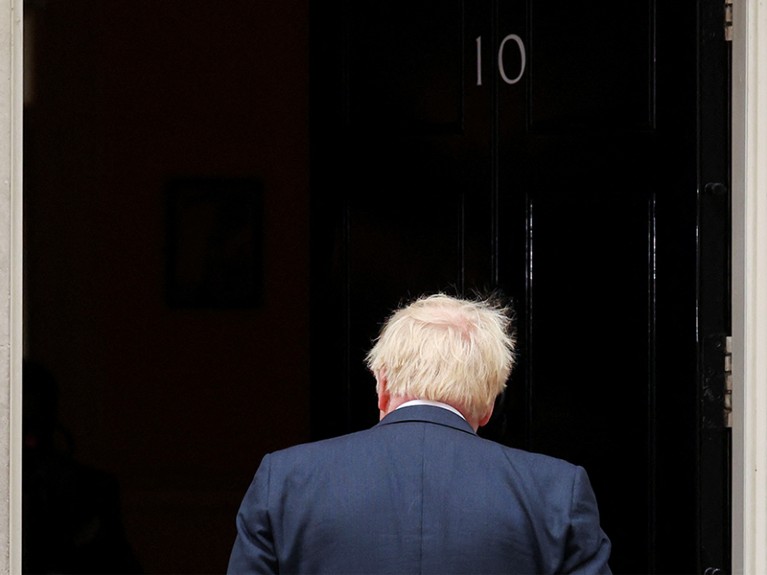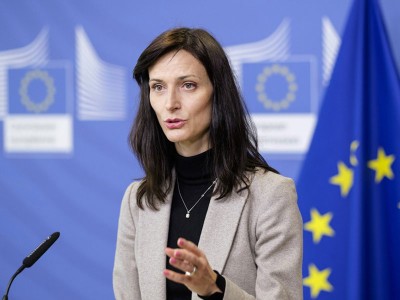
Boris Johnson’s departure opens the way for more constructive partnerships between the UK government and research.Credit: Phil Noble/Reuters
Boris Johnson’s forced resignation on 7 July was, arguably, the most chaotic in British political history. It came after more than 50 of his ministers resigned within 48 hours. When Johnson will actually leave 10 Downing Street still isn’t clear; he is currently in a ‘caretaker’ role and could remain in office for some months. But change at the top offers glimmers of hope for researchers, provided Johnson’s successor recognizes the damaging effects of current policies and acts swiftly to mitigate them.
The government must cease its damaging and ill-considered fights with the scholarly community. It has to stop undermining the autonomy of universities. Political obstacles to UK access to European Union research funding must be rapidly removed. And a sea change is needed in the United Kingdom’s overall relationship with its European partners.
Pressing pause on a draft law (the Northern Ireland Protocol Bill) has to be an urgent priority. The law, if enacted, would override key obligations that the UK government agreed to as part of its exit agreement with the EU. The UK Parliament is due to discuss the bill this week. In response to the possibility of this law being passed, the EU has begun legal action, and is stopping UK-based researchers from continuing to participate in its €100-billion (US$101.8-billion)Horizon Europe funding programme, the world’s largest such scheme. If the passage of the law can be suspended and UK officials return to negotiating with EU counterparts, there might still be hope for UK researchers to rejoin Horizon Europe through the country becoming an ‘associated’ nation. Unless that happens, there’s little prospect of UK-based researchers participating in Horizon Europe under the terms originally agreed.
UK’s rupture with Horizon Europe is totally unnecessary
The UK government had previously promised to provide researchers with interim funding should there be delays to rejoining Horizon Europe. It has also been working on a fully fledged ‘Plan B’ funding mechanism to support international collaborations with UK researchers in the event that EU association turns out not to be possible. The precise arrangements for the scheme are still being worked out. The architect of these discussions, science minister George Freeman, was among the scores of ministers to quit Johnson’s government.
The incoming science minister must work urgently and constructively with the UK Treasury to accelerate this work and to ensure that the Plan B funding is protected, otherwise there is a risk it will be spent on other priorities. Further down the line, Johnson’s successor should consider merging the roles of science minister and universities minister. Until recently, one minister was responsible for both areas, but in early 2020 the job was split for no beneficial reason. This has resulted in some very mixed messages from the government.
Whereas Freeman sought to engage with researchers to try to resolve their concerns, his colleague MichelleDonelan, the minister for universities until last week, sometimes took a different approach. On 27 June, Donelan wrote to universities saying that institutions should not need to comply with independent equality and diversity compliance measures, and specifically named the Race Equality Charter as an example.
Previously, the government had also downgraded the Athena SWAN Charter, a set of policies and actions designed to promote gender equality in universities. The government claimed that such schemes compromise academic freedom, but failed to provide credible evidence to support this view. The government must swiftly and publicly rescind Donelan’s letter. As Nature recently affirmed, good science requires a conscious effort to protect people from harm — and that should include protecting those involved in doing the research.
Last week, Johnson’s new education minister, James Cleverly (who is the fourth minister the education department has had in three years), pledged that the caretaker administration would not do anything to “tie the hands” of its successors. This potentially clears the way for the building of more constructive partnerships. But, given the Johnson government’s elastic relationship with the truth, such words cannot be taken on trust. That, more than anything, is why Johnson and his caretaker administration need to exit quickly.
The Johnson government’s three years were characterized by a shocking and persistent disregard for rules, for the truth and for expert evidence — all of which culminated in extreme positions on a number of policy issues. A reset is urgently needed in the United Kingdom’s relationship with the EU and in the government’s dealings with universities. The installation of a new set of people offers the best chance for everyone to move forwards from the nightmare of the past three years.

 UK scientists fear they will be locked out of €100 billion EU research programme
UK scientists fear they will be locked out of €100 billion EU research programme
 UK’s rupture with Horizon Europe is totally unnecessary
UK’s rupture with Horizon Europe is totally unnecessary
 Research must do no harm: new guidance addresses all studies relating to people
Research must do no harm: new guidance addresses all studies relating to people
 Equality and diversity efforts do not ‘burden’ research
Equality and diversity efforts do not ‘burden’ research




